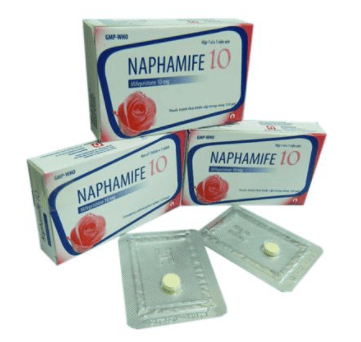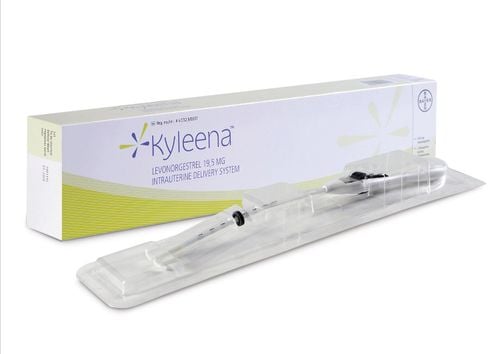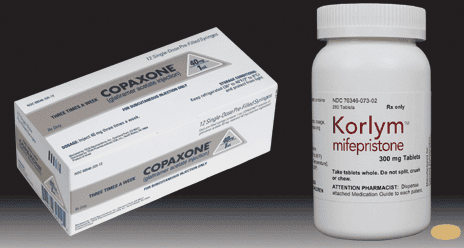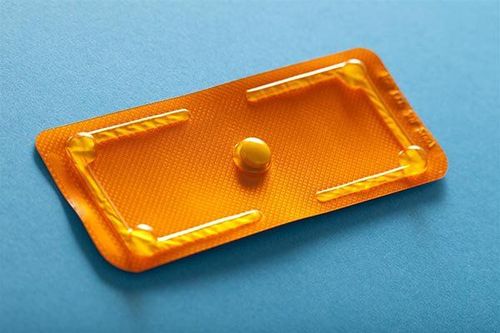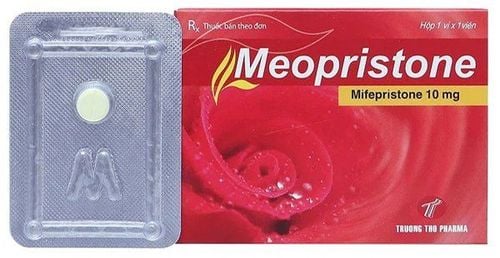This is an automatically translated article.
Miphease drug is made in the form of tablets with the main ingredient in each tablet is 25mg Mifepristone. So what does Miphease do, how to use it?
1. What are the effects of Miphease?
The main ingredient of Miphease is Mifepristone, an antiprogestin.
Miphease has a contraceptive effect by acting before the implantation of a fertilized egg. Miphease has a dual effect by preventing ovulation and endometrial growth. The most important effect of Miphease is to delay ovulation due to its ability to disrupt the maturation of the follicle and the endocrine function of the granulosa cells, preventing the LH peak in the middle of the menstrual cycle.
Miphease also has an effect on the endometrium if used after ovulation and affects the implantation of a fertilized egg. In addition, 50% of women using Miphease will experience luteal degeneration, which makes the endothelium more prone to detachment.
Mifepristone acts as an antiprogesterone agent, by competing with endogenous progesterone for the receptor. This active substance has a very high binding affinity for these receptors, 2-10 times higher than that of progesterone.
Mifepristone works to block the effects of progesterone on the endometrium and peritoneum. This will lead to degeneration and shedding of the uterine lining, thereby preventing or disrupting the attachment of the embryo to the uterine wall for implantation.
2. Indications and contraindications of the drug Miphease
Miphease is indicated in the following cases:
Termination of an intrauterine pregnancy, with a pregnancy of 49 days or less, from the first day of the last menstrual period. Miphease is contraindicated in the following cases:
Chronic adrenal insufficiency. People who are sensitive to Mifepristone or any of the ingredients in Miphease. The patient is on long-term corticosteroid therapy. People with bleeding disorders or taking anticoagulants. Pregnant women who are more than 49 days old. Accurately identify or suspect an ectopic pregnancy. People who are sensitive to Prostaglandins. People who have or have had heart disease or cardiovascular disorders such as angina pectoris, irregular heartbeat, Raynaud's syndrome, heart failure and severe drop in blood pressure. Women who are over 35 years old and smoke more than 10 cigarettes a day. People with porphyria. People with hemophilia. Precautions while using Miphease:
Miphease is not a substitute for regular birth control. Continuing to have sex after using Miphease may increase the risk of an unwanted pregnancy. Pregnant women taking Miphease pills, although it does not cause miscarriage, can have bleeding. Breastfeeding women take Miphease, the active ingredient Mifepristone will pass into breast milk, but the effect of the drug on the baby has not been determined.
3. Dosage and how to use Miphease
Miphease is used orally. Use a dose of 200mg in combination with Ibuprofen or Paracetamol for pain relief. After 2 weeks of using the drug, go back to the doctor.
4. Side effects of the drug Miphease
Side effects that you may experience while using Miphease include:
Bleeding: All women using Miphease will have some bleeding and the rate of bleeding will depend on the gestational age. . Uterine contractions causing pain Feeling upset stomach, vomiting, and diarrhea symptoms Lowering blood pressure Eczema Urticaria Erythema Erythema (lupus) Skin necrosis Headache Body discomfort Hot flashes Dizziness Chills Mild fever. If you find any unusual symptoms appear after using Miphease, please notify your doctor immediately or ask a loved one to take him to a medical facility for timely treatment.
5. Miphease interactions with other drugs
Using Miphease with Ketoconazole, iIraconazole, Erythromycin and fruit juice (grape) can prevent the catabolism of Mifepristone, thereby increasing the concentration of the drug in the serum. Concomitant administration of Miphease with Rifampicin, Dexamethasone, St. John's Wort and certain antiepileptic drugs (eg, Phenytoin, Phenobarbital, Carbamazepine) will increase the metabolism of Mifepristone, thereby reducing serum concentrations. Non-steroidal anti-inflammatory drugs (NSAIDs) such as Aspirin should not be used with Miphease because they are anti-prostaglandin drugs and will reduce the effectiveness of Mifepristone. The information about Miphease in the article is for reference only, you need to carefully read the instructions for use, consult your doctor / pharmacist before use. Note, Miphease is a prescription drug, patients need to use the drug as prescribed by the doctor, absolutely do not adjust the dose on their own.




